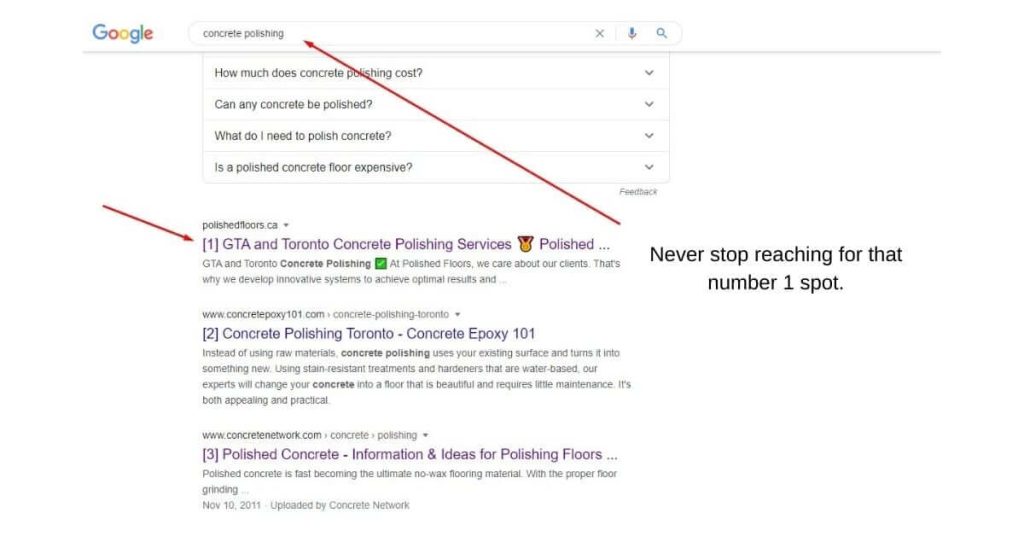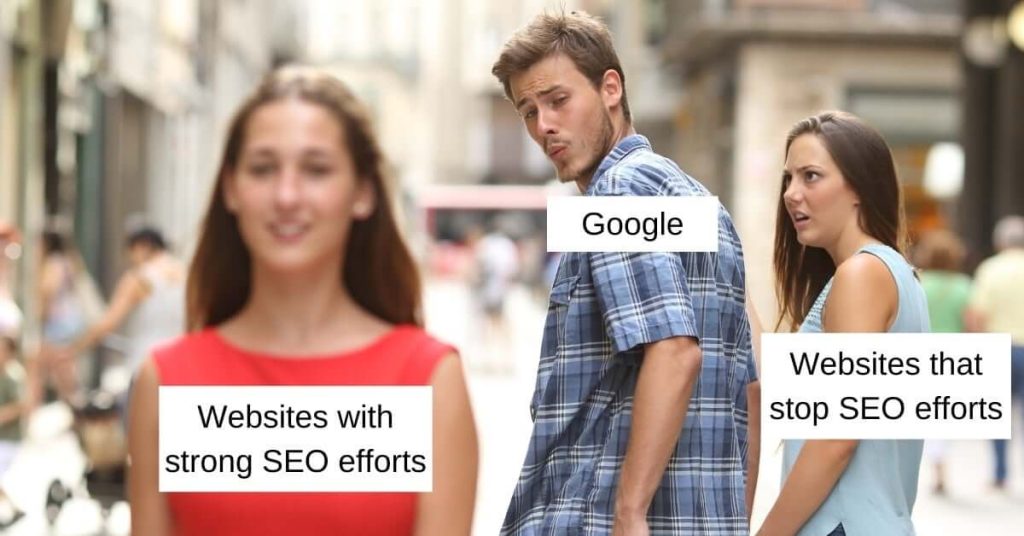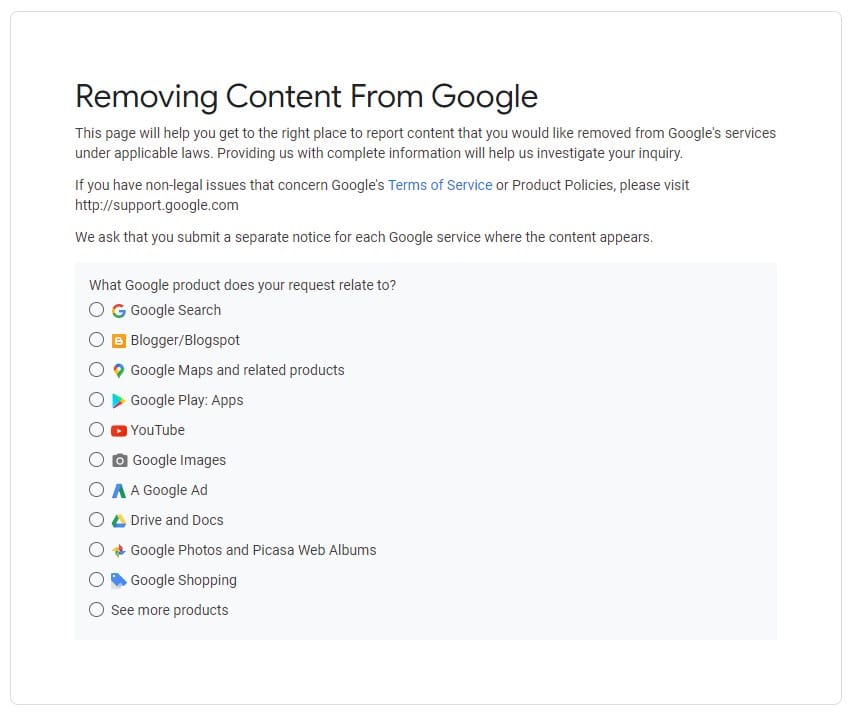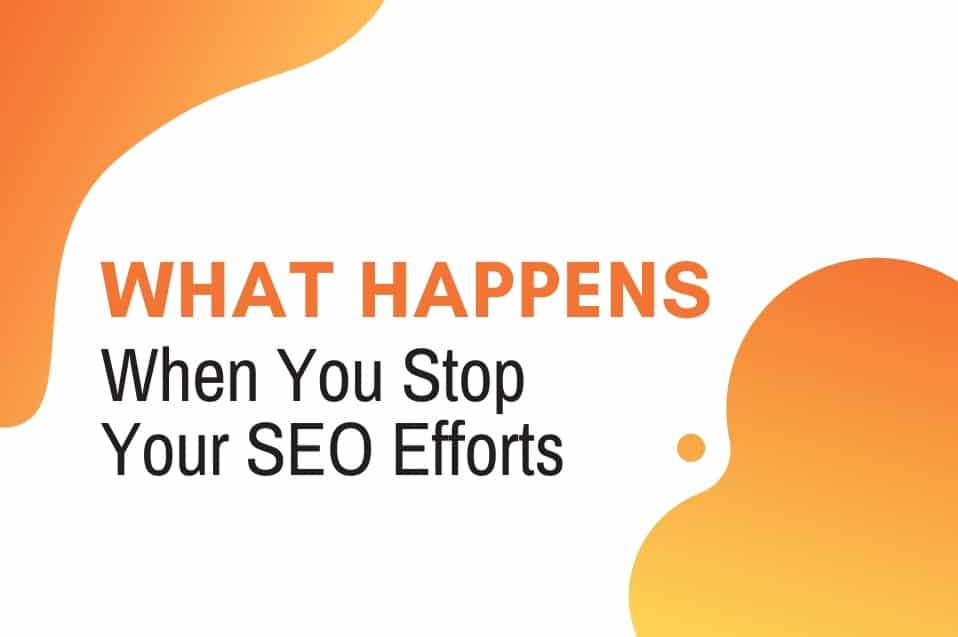In the world of online marketing, SEO is kind of a big deal. Overall, when it comes to searches on Google, organic search still reigns supreme over paid and social searches on both mobile and desktop. This is why it is so important to make SEO an integral part of your online marketing strategy.
If SEO is not currently part of your online marketing toolbox, then it is time to change that. If you are on top of your SEO Toronto, great, keep it up. Seriously, DON’T STOP THE SEO TRAIN. Whether you have experienced a lot of success in this arena or are still waiting to see the fruits of your labour, you should always have a “full steam ahead” approach to your SEO efforts.

It is important to remember that SEO is a long-term, continuous process. It can take a while for pages on your website to climb the rankings on search results for various targeted keywords. Conversely, you can achieve your desired results rather quickly; but that doesn’t mean you won’t gradually drop in rankings if you don’t continually work at it.
Whether or not you have achieved success with SEO, it is possible that at some point you have thought to yourself: what would happen if I just stopped doing anything for SEO? That’s what this article is going to answer for you. So let’s crack open this topic and dive in.
What Happens When You Stop SEO?
It is important to note at this point that you may not see seismic shifts right when you pause your SEO tactics. Over time, you may drop in search rankings, but it’s also possible that you will hold onto your positions. These things can be hard to predict.
But one thing we do know is that stopping your SEO efforts does present a potential risk. Stopping SEO and leaving your site as is signals to Google that the site isn’t active anymore. By engaging in the best SEO practices, you put your website in a strong position to be favoured by search engines like Google. When you stop your SEO-related activities, you risk bearing the brunt of Google’s wrath – which of course leads to you dropping in search rankings for the primary keywords you target.

At this point, you may be thinking to yourself, “Why does this happen? Why isn’t it enough for me to just get to the top 3 positions for my keywords? Why do I have to continue doing SEO after I have achieved my desired results?”
To put it simply, Google wants websites to be relevant to users. This means that the content they display for users has to be timely, topical, unique, and informative. If Google’s algorithm thinks that a page does not, or no longer, adhere to its guidelines and requirements, then it won’t display it in the results of a user’s search query.
So what factors into this? Let’s take a look at the SEO activities that businesses do to keep their websites relevant for search engines, starting with:
1) Staying On Top Of Google Algorithm Changes
 Google updates its algorithm all the time – we’re talking thousands of updates, changes and improvements a year at times. Some of these may not impact your site, but others will.
Google updates its algorithm all the time – we’re talking thousands of updates, changes and improvements a year at times. Some of these may not impact your site, but others will.
This is why it is important to stay on top of algorithm updates. You never know when an update will come out that will negatively impact pages that are targeting certain keywords. That’s why it is best to keep up with these updates and make changes on your site accordingly.
Let’s look at the mobile update as an example:
This update went into effect in April 2015 as a response to the rise in searches taking place on mobile devices. In a nutshell, this update prioritizes mobile versions of websites. For businesses, this meant working on the mobile version of their websites to ensure it provides a user-friendly experience (ie. text is easy to read, the site is easy to navigate, the site loads fast, all content fits neatly into a certain resolution, etc.).
2) Targeting New Keywords
Coming up with a list of keywords to target on your website is a big part of the SEO practitioner’s toolbox. These are the keywords that users will type into a search query, which means this is the best path for a user to take to find your website.
When you are optimizing for important and relevant keywords, you are constantly updating your site to highlight your current list of keywords and researching new keywords that can be important to you. This is an important exercise because it can create opportunities for you, either by targeting a new keyword that no one is looking at or optimizing a keyword that your competitors are not targeting.
This is how you get a competitive edge and keep yourself from standing still while your competitors are working on getting ahead of you.
3) Content Creation
Content creation usually goes hand-in-hand with your strategy for targeting keywords. Once you have your keywords, then you start planning content based on those keywords.
This content can take the form of a blog, landing page, additional content for existing pages, new FAQs based on recent interactions with your customers, and links to relevant pages on your site or helpful articles on other websites. Businesses need to have a plan for content creation because it supports your keywords and keeps your website fresh, informative and relevant for users.
This is such a good way to signal to Google that you are a reliable source of information within your industry. When Google sees that you are populating your site with topical information, then it rewards you with better search results.

BONUS: Having quality content on your website can lead to other websites linking to your content, which will help improve your site’s authority.
When you stop updating the content on your site, you provide an opening for your competitors to generate new content that makes your website look outdated. You want to be the authority within your industry, not the guy that seems out of touch with new trends.
4) Layout Changes On Your Website
When you launch a website, you must surely love the way it looks at that point. But this doesn’t mean the design and your layouts can never change.
Maybe during an SEO audit of your website, you may discover opportunities to improve the user experience. Or maybe you receive feedback from your customers about improvements they would like to see on your website.
If your site provides a poor experience, for example, this can lead to a high bounce rate. This is a signal you don’t want Google to see because it tells the algorithm that people find your site confusing or difficult to navigate.
5) Monitor Your Site For Bad Links
Here’s something that search engines hate: spammy links. Your site has plenty of backlinks, and if you don’t monitor these links, then you can quickly lose track of the bad links that you want nothing to do with.
The best practice is to stay on top of these links and disavow any bad/spammy links. By disavowing links, you are sending a message to search engines that says, “Don’t consider these links when you crawl my website. Please.”
In light of their link-building strategy, many businesses have the mentality that the more links to their site the better. This is not always true though.
Ultimately, you want to aim for high-quality links. So you should immediately disavow any spammy links, backlinks from sites that were built just to display links, links in spammy comments (maybe as part of a blog article), or backlinks from sites that are outside the country you operate within.
6) Scanning For Duplicate Content
The Internet is a pretty democratic place, where anyone can make a website and write just about anything they want.
Because of the nature of the Internet, there is nothing stopping someone from copying and pasting content they like from one website onto their website.
Obviously, you want to stay on top of this because it is not right for someone to steal content from your website. Furthermore, you don’t want your website to be in a situation where the Google algorithm has to choose between your site and the website that copied your content. This can lead to you dropping on search queries or not showing up at all in the results.

This is why you want to make sure that you are scanning competitors’ websites or other websites within your industry to make sure your content is not being stolen. If you do find a site that has copied your content, you can always message the company and ask them to change the content on their site. If this does not work, you can file a request for content removal from Google.
The SEO activities listed in this article are essential for any business that wants to stay competitive. Algorithms are pretty demanding, which is why it is always best to maintain or double your SEO efforts and not stop your efforts. When a business puts a hold on its SEO, it risks dropping in search results or missing an opportunity to find new ways to grow and reach new customers.
Here at Gilmedia, we help take our clients’ SEO Toronto efforts to a new level. We have helped many businesses go from being nowhere on Google to benign the first result for various search queries. If you are looking to perform better on Google, then we encourage you to get in touch with our SEO experts. Give us a call today at (647) 478-5858 and let’s talk about what we can do for you. You can also send us a message through our contact page.


